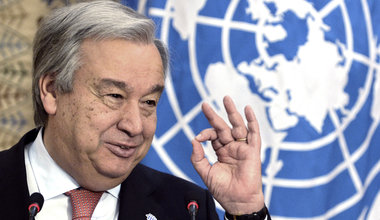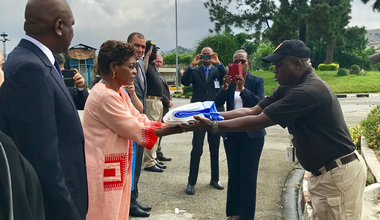Security Sector Reform : Lunctime debate on DDR process in Gbéké region
The third lunchtime dicussion organised by the regional office of the Security Sector Reform Division of the United Nations Operation in Côte d'Ivoire (UNOCI) was held on Thursday, 29 January 2015 at the headquarters of the UN Mission in Bouaké.
The meeting whose theme was ''The Disarmament, Demobilisation and Reintegration (DDR) process in the Gbéké Region'', brought together local administrative authorities, members of parliament, political party representatives, members of civil society and non-governmental organisations, the media and members of the defence and security forces.
In his opening remarks, the head of the SSR regional office in Sector East, Mamadou Touré said that the meeting was proof of UNOCI's willingness to support efforts by the national authorities to decentralise the SSR process. He then recalled that the programme was a global process aimed protecting the people in Côte d'Ivoire from fear and need, which he said constituted a guarantee for the consolidation of peace, security, stability and lasting development.
For his part, the representative of regional office of the Reinsertion and Reintegration Projects and Programmes of the national Authority for DDR (ADDR) in Bouaké, Adama Coulibaly, a deplored the stigmatisation of ex-combatants, the length of time taken up to set up programmes for ex-combatants that have been demobilised who some times turn to crime and the failure to involve the communities in the process.
Mr. Coulibaly said that part of the many challenges facing the process were the fact that ADDR activities and the DDR process itself were scheduled to end on 30 June 2015.
During the discussions which followed the presentations, several questions were raised on the lifting of the UN arms embargo, the limit between ADDR's intervention and that of the National Commission for the Fight Against the Proliferation and Circulation of Illicit Light and Small Calibre Weapons (COMNAT-ALPC), the future of DDR process after 2015 and the fate of demobilised ex-combatants who are still waiting for their reinsertion kits.
The recommandations made after the discussions were aimed at encouraging the promotion of a communication and sensitisation campaign aimed at encouraging all concerned to take charge of the DDR process. Participants also called for greater inclusion of ex-combatants in debates and forums organised specially for them. They stressed the need to strengthen the resocialisation of ex-combatants and encourage local and national authorities to optimise the involvement of partners such political parties, elected local officials, civil society groups and defence and security forces in DDR activities.
 UN
UN United Nations Peacekeeping
United Nations Peacekeeping




